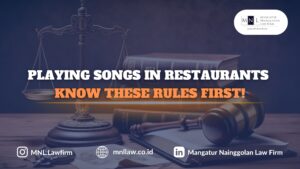
Playing Songs In Restaurants, Understand These Rules First!
Bali Police investigators have named PT Mitra Bali Sukses Director I Gusti Ayu Sasih Ira as a suspect. I Gusti Ayu Sasi Ira is suspected of playing songs in various Gacoan Noodle restaurants or outlets in Bali. What are the rules for playing songs in restaurants? How serious are the sanctions for playing songs in restaurants without permission?
Copyright on Songs
A song is defined as a series of tones combined with rhythm and complemented by poetry. Songs are included in creations protected by Law No. 28/2014 on Copyright (“Copyright Law”). Songs have exclusive rights for creators that arise automatically based on the declarative principle after a work is realized in real form without reducing restrictions in accordance with the provisions of laws and regulations.
Exclusive Rights of Phonogram Producers
In addition to providing exclusive rights to the creator, song copyright also provides exclusive rights for phonogram producers as part of related rights. A phonogram producer is a person or legal entity that first records and has the responsibility to carry out sound recording or sound recording, both performance recording and recording of other sounds or sounds.
The Economic Value of Phonogram Producer Exclusive Rights
Like copyright, the exclusive rights of phonogram producers have economic rights. The phonogram producer is entitled to economic benefits from the recording of the song. Furthermore, the economic rights are realized in the form of royalties.
Government Regulation Number 56 of 2021 concerning the Management of Royalties for Copyright of Songs and / or Music (PP 56/2021) defines royalties as a form of compensation for the utilization of the economic rights of a work or related rights product received by the creator or owner of related rights including phonogram producers.
Meanwhile, what is meant by commercial use is the utilization of songs with the aim of obtaining economic benefits from various sources or paid (vide Article 1 Point 12 of GR 56/2021).
Article 3 Paragraph (2) of GR 56/2021 details the use of songs in the form of commercial public services including the use of songs on:
- Commercial seminars and conferences;
- Restaurants, cafes, pubs, bars, bistros, nightclubs, and discotheques;
- Music concerts;
- Airplanes, buses, trains, and ships;
- Exhibitions and fairs;
- Movie theaters;
- Telephone waiting tone;
- Banks and offices;
- Shops;
- Recreation centers;
- Television broadcasting institutions;
- Radio broadcasting organizations;
- Hotels, hotel rooms, and hotel facilities; and
- Karaoke business.
Prohibition of Playing Songs in Restaurants Without Permission
Article 24 Paragraph (2) of the Copyright Law gives the right to Phonogram Producers to carry out themselves, give permission, or prohibit other parties to carry out:
- Reproduction of Phonogram in any way or form;
- Distribution of the original Phonogram or copies thereof;
- Rental to the public of copies of Phonograms; and
- The provision of a phonogram with or without cable that is accessible to the public.
Although the phonogram producer has the right to prohibit other parties, these other parties can make Commercial Use of songs and/or music in the form of commercial public services by paying Royalties to the Creator, Copyright Holder, and/or the owner of Related Rights through the National Collective Management Institution (LMKN).
Playing recorded songs in restaurants is qualified for commercial use. Playing songs in restaurants without the permission of the Phonogram Producer is a form of violating the provisions of Article 24 Paragraph (2) of the Copyright Law with criminal sanctions stipulated in Article 117 paragraph (2) of the Copyright Law which reads:
Any person who intentionally and without the right to infringe economic rights as referred to in Article 24 paragraph (2) letter a, letter b, and / or letter d for commercial use, shall be punished with a maximum imprisonment of 4 (four) years and / or a maximum fine of Rp 1,000,000,000.00 (one billion rupiah).
In order to avoid the trap of criminal sanctions, restaurants that want to play songs must make payments to LMKN, namely through the stages of Identifying Songs and Licenses, Calculating the Amount of Royalties, Submitting License Applications, Paying Royalties, Reporting Usage.
Conclusion
Playing songs in restaurants including commercial use and playing songs without the permission of the relevant phonogram producer violates the provisions of Article 117 Paragraph (2) of the Copyright Law with a maximum imprisonment of 4 (four) years and/or a maximum fine of Rp 1,000,000,000.00 (one billion rupiah). It is certain that playing songs without the permission of the phonogram producer in restaurants does not pay royalties.
Author :
Petrus Gabe Pandapotan
Yuliana Munthe
Editor :
Muhammad Arief Ramadhan, S.H.
